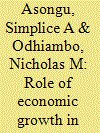| Srl | Item |
| 1 |
ID:
154786


|
|
|
|
|
| Summary/Abstract |
The importance of science in development has been increasingly recognised in development discourses and policy since 2000. Engineering is less visible though engineering and engineers are important for the building and maintenance of transport, water, energy, industrial, informatics, urban and health systems. This article aims to investigate why engineering has not received more emphasis, including why development engineering has not been institutionalised like tropical medicine. It explores the nature of engineering in development, highlights recent efforts to headline engineering for development and, using analyses of what engineers know and do inside international development, suggests that its profile and effectiveness is emerging.
|
|
|
|
|
|
|
|
|
|
|
|
|
|
|
|
| 2 |
ID:
186875


|
|
|
|
|
| Summary/Abstract |
This study establishes economic growth needed for supply-side mobile money drivers in developing countries to be positively related to mobile money innovations in the perspectives of mobile money accounts, the mobile phone used to send money, and the mobile phone used to receive money. The empirical evidence is based on Tobit regressions. For the negative net relationships that are computed, minimum economic growth thresholds are established above which the net negative relationships become net positive relationships. The following minimum economic growth rates are required for nexuses between supply-side mobile money drivers and mobile money innovations to be positive: (i) 6.109 percent (6.193%) of Gross Domestic Product (GDP) growth for mobile connectivity performance to be positively associated with the mobile phone used to send (receive) money and (ii) 4.590 percent (4.259%) of GDP growth for mobile connectivity coverage to be positively associated with the mobile phone used to send (receive) money.
|
|
|
|
|
|
|
|
|
|
|
|
|
|
|
|
| 3 |
ID:
175059


|
|
|
|
|
| Summary/Abstract |
Over the past two decades, scholars have developed undone science and inclusive innovation to explain knowledge silos, technology and development for marginalised communities. The undone science framework describes the systematic neglect of scientific issues that impact marginalised groups. The inclusive innovation framework emphasises the need to produce innovations that directly benefit marginalised groups. Despite the similar goals of the frameworks, the undone science and inclusive innovation theoretical communities have not interacted with each other, and as a result, the insights from each framework fail to help other disciplines improve opportunities for marginalised groups. This article compares the frameworks by examining nanotechnology policy and research in South Africa and shows how the frameworks help create better policies for marginalised groups. Because the frameworks emphasise different issues, policymakers should use both frameworks as opposed to over-relying on one of them.
|
|
|
|
|
|
|
|
|
|
|
|
|
|
|
|